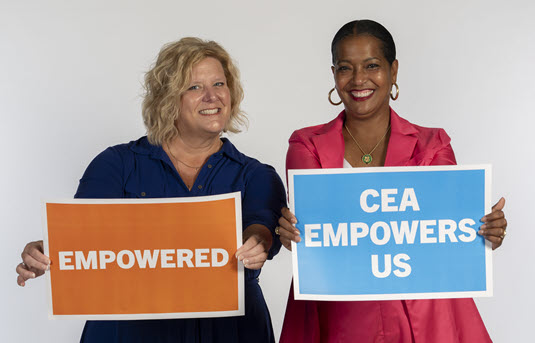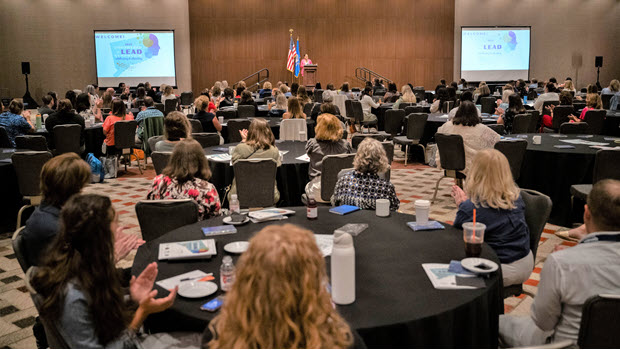What does leading look like at your school or in your community? In the field of education, superintendents and principals are often thought of as the leaders, but a recent conference presented by the Connecticut Teacher of the Year Council at Mohegan Sun emphasized that all teachers can be leaders.
The theme of this year’s Empowered to Lead Symposium, celebrating and elevating, focused on the power of the education profession and the vital work that teachers do, impacting thousands of young lives.
Opening remarks by both Congresswoman Jahana Hayes and CEA President Kate Dias underscored that when teachers speak up and lead with the expertise they have gained from years in the classroom, they have the ability to sway hearts and minds and improve education policy.
Hayes said that when she was first named Connecticut and then National Teacher of the Year, she felt like an imposter when she was invited into spaces with politicians, businesspeople, and policy leaders.
“In one of my first instances as the National Teacher of the Year I was invited to a conference, and John McCain was there. I was sitting next to him, and I could feel my shoulders shrinking because as they went around the room, introducing all of these people with all of these super long, fancy titles, I’m thinking, ‘What can I add to this conversation?’ And by the time they got to person 26, I said, ‘Wait, am I the only teacher here?’”

CEA President Kate Dias and Congresswoman Jahana Hayes underscored the many ways teachers can lead and be voices for change.
Hayes said that was an aha moment for her because she realized, as a classroom teacher, she was the only true expert on education in the room.
“I was imbued with the confidence to speak up, not just for me, but for you, and for your kids, and for my kids. I say that to you because you will walk into many rooms and many spaces with lots of people with long titles, but teaching is the thing that you know. That is where you are the experts. That is when you bring the energy, that is when you can talk with specificity about what we need as a profession. Do not shy away from that.”
“It’s our voice that centers the work that needs to be done,” said Dias. “And it is our voice that informs intelligently about the change that is so necessary to our beloved profession. So when we say the power to lead–yes, please.”
Dias told educators that theirs is the profession with the most power to influence the world.
“There’s no one more powerful than us when we embrace that power. We always have to remember what our value proposition is. Investing in educators will always get you a loyal, highly educated workforce. Teachers are committed to ensuring all children have the opportunity to be wildly successful.”
 Some educators are hesitant to get involved with politics, but Hayes urged anyone who feels that way to reframe what it means to be political.
Some educators are hesitant to get involved with politics, but Hayes urged anyone who feels that way to reframe what it means to be political.
“I hear teachers say, ‘I don’t talk politics.’ I hope you are engaged in policy. I hope you know that your profession depends on you being active and educated in the policy and the work that people are doing on your behalf. Demand of yourself the same things you demand of your students.”
“We are in this moment where we have the voices and spaces where we can really promote change,” said Dias. “That’s exciting and that is an opportunity and it’s up to us whether and how we’re going to seize this moment and have our say, because people are starting to listen.”
“For far too long teachers have been outside of the rooms when the doors closed and the decisions were made,” Hayes said. “We’ve heard many, many times. If you are not at the table, you are on the menu.”
“Let’s double down on education,” Dias said. “It’s an investment that pays off. Because of a teacher we all have the potential to do incredible things. And this state of Connecticut has the potential to be the ideal place to be. Double down, engage, and make sure that your voice is at every table.”







